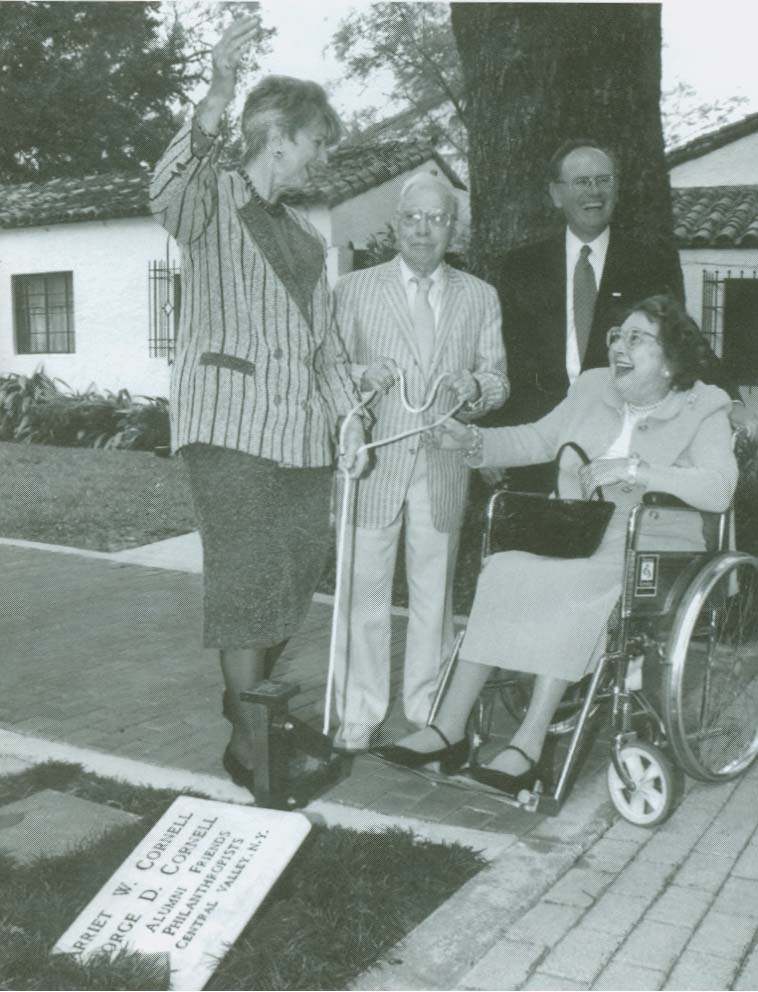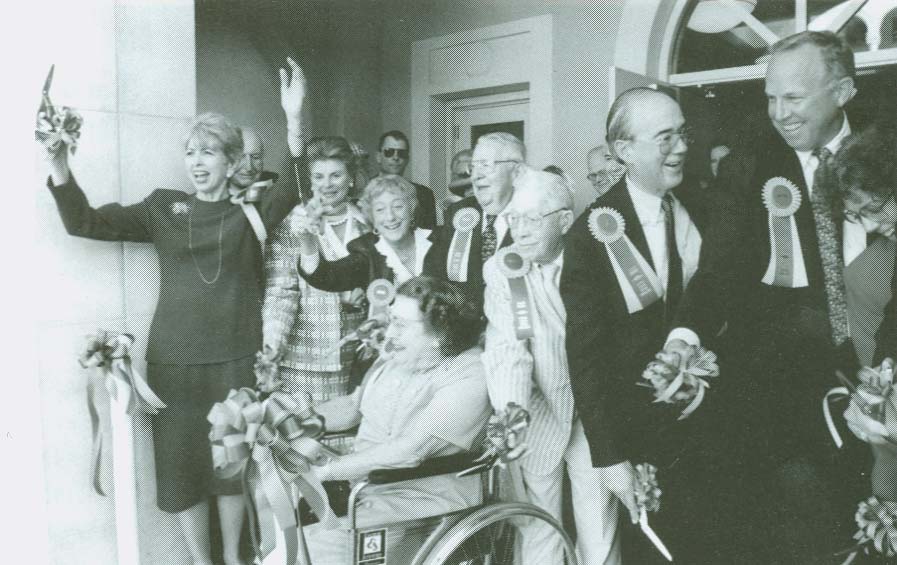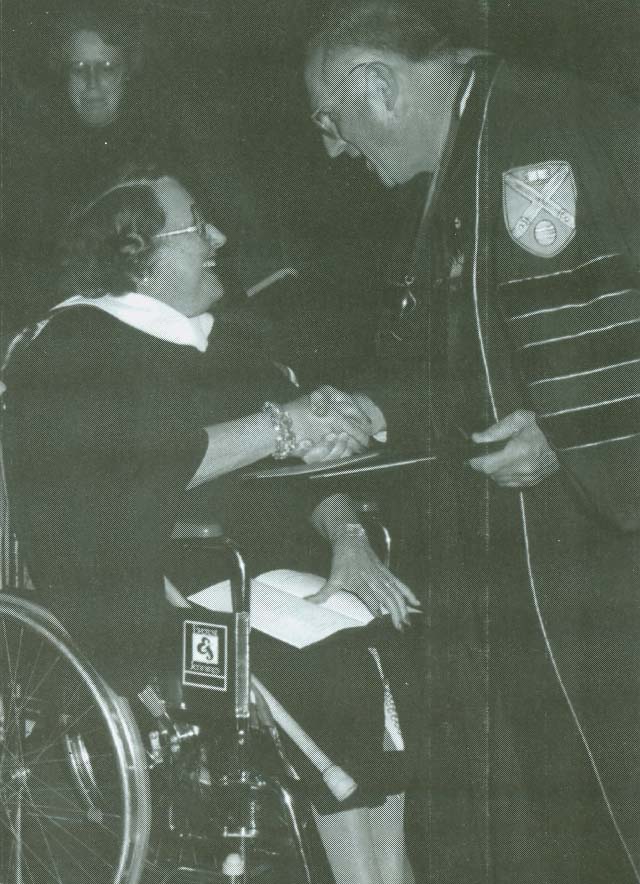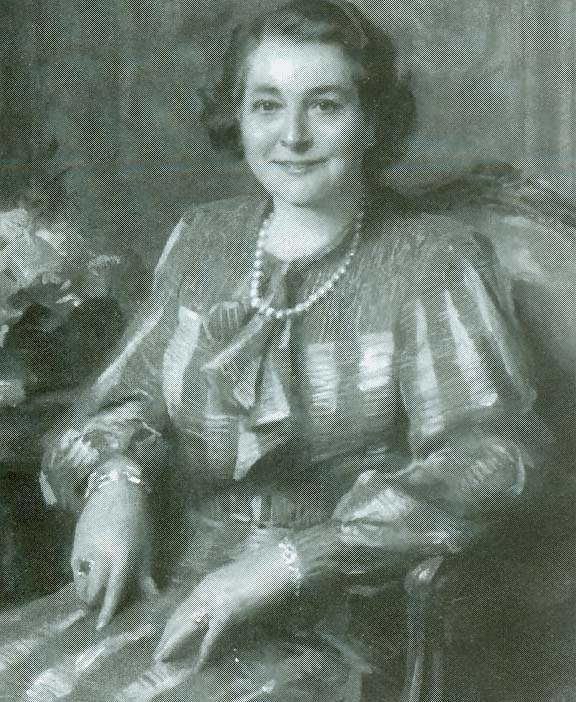Harriet Wilkes Cornell
'35HAL '90H
(1914-1999)
A Loving Legacy
On August 2, 1999, Rollins College lost a treasured friend. With her husband, George '35 '89H, Harriet Cornell literally changed the face of the College. As Rollins President Rita Bornstein said, "As we walk the campus, we see the name 'Cornell' on every comer of the campus, and we see how much a part, how embedded they are in the life and the evolution of this wonderful institution."
Harriet
Wilkes and George Cornell
were
introduced by
mutual
friends,
the grandchildren
of Don Tomas
Estrada-Palma, who had run
a school
with George's grandfather before
becoming president
of Cuba.
The
couple's
dates
were
often a
movie
followed
by
homemade
pie at
a
nearby
restaurant.
Harriet
and
George
married
in
1936,
and their
wedding
present
from
George's
father
was a
Model
A Ford. With
typical
spirit,
Harriet
asked
if
they
could
have
a convertible.
The
Cornells
started
their
life's
journey
together
in a
blue
"Tin
Lizzie"
with
the top
down.

The Cornells' travels weren't limited to the highway, however. She loved cruises, and George, who was president of the Flying Club at Rollins, flew his own plane. Gary duPont Lickle '76 '77CR, who discovered the barnstorming Cornells were "an adventuresome couple," enjoyed their stories of flying from New York to Florida, landing in fields when the weather turned bad.
The Cornells first took up residence in Manhattan, visiting their hometown, Central Valley, N.Y, in the summers. When George accepted a position with the Central Valley National Bank, they had the opportunity to move back. Both Harriet's and George's families have deep roots in Central Valley and surrounding Orange County, dating from Colonial times. Harriet's grandfather's family produced chain that was placed across the Hudson River to thwart British troops during the Revolution.
Like George's father, who had wintered in Florida for years, the Cornells began spending part of their time in Delray Beach. In 1950, they built a second home there. Ultimately they would divide the year between Central Valley and Delray Beach, and they actively contributed to improving the quality of life of both communities.
The Cornells shared a special affection for dogs ("They love you, no matter what," Harriet explained), and in the first month of their marriage, they welcomed Ivan Demetree, a Samoyed. Georges family was one of the first in the US to own Samoyeds, and Ivan was the first of a series that spanned the Cornells' marriage. Last spring, after several years without a canine companion, Harriet surprised George with a new puppy: Ivan III.
For some time, the Cornells collected their dogs' fur, hoping it could be used for a creative purpose. Richard Summers, a 1970s Rollins art instructor, successfully spun and wove the fur into a lap robe and wall hanging for the Cornells. Understandably, the fur art made headlines.
The Cornells' interest in animals extended well beyond dogs. They became good friends and supporters of anthropologist and conservationist Jane Goodall, known for her pioneering work with African chimpanzees. Closer to home, their contribution to the Dreher Park Zoo in West Palm Beach funded the Cornell Nature Trail through a cageless rain forest.
Central to the Cornells' lives has been their extraordinary generosity, which gave them both great pleasure. Harriet commented, "We've enjoyed seeing the results of our gifts and seeing other people enjoy what we have given." The Cornells have been Rollins' largest contributors, and they also contributed to Cornell University, named for the first cousin of George's grandfather. Rollins trustee Thomas P. Johnson '34 '82H '99H described Harriet as "an active partner" in the Cornells' philanthropy. "She had a great fondness for Rollins," and encouraged George's support of his alma mater.
 In 1973,
the Cornells pledged
the
gift that
created Rollins'
George D. and Harriet
W. Cornell
Fine
Arts Museum
and
Cornell
Art
Center,
which
houses
the
Department
of
Art.
Their
support
was
recognized
by
the Presidents
Council
of
the
Independent
Colleges
and
Universities
of Florida
with
its Champion
of
Higher
Independent
Education
in Florida
(C.H.I.E.F)
Award
in 1980.
The
commitment
to
the
Cornell
Fine Arts
Museum
was
followed
by
gifts
to
support
construction
of the
Alfond
Stadium
and to
endow
scholarships
for
art students
and the
George
D. and
Harriet
W. Cornell
Chair
of Classics,
now
shared
by
two
Cornell
Scholars
in Classical
Studies.
In
1996,
the
Cornells
pledged
an
additional
$1.5
million
for expansion
of
the
Cornell
Museum.
Harriet's
particular
interest
in floral
art
was also
reflected
in their
gift
of the
"Cornell
Cafe South"
to
the
Morikami Museum
and Japanese Gardens
in
West
Palm
Beach.
In 1973,
the Cornells pledged
the
gift that
created Rollins'
George D. and Harriet
W. Cornell
Fine
Arts Museum
and
Cornell
Art
Center,
which
houses
the
Department
of
Art.
Their
support
was
recognized
by
the Presidents
Council
of
the
Independent
Colleges
and
Universities
of Florida
with
its Champion
of
Higher
Independent
Education
in Florida
(C.H.I.E.F)
Award
in 1980.
The
commitment
to
the
Cornell
Fine Arts
Museum
was
followed
by
gifts
to
support
construction
of the
Alfond
Stadium
and to
endow
scholarships
for
art students
and the
George
D. and
Harriet
W. Cornell
Chair
of Classics,
now
shared
by
two
Cornell
Scholars
in Classical
Studies.
In
1996,
the
Cornells
pledged
an
additional
$1.5
million
for expansion
of
the
Cornell
Museum.
Harriet's
particular
interest
in floral
art
was also
reflected
in their
gift
of the
"Cornell
Cafe South"
to
the
Morikami Museum
and Japanese Gardens
in
West
Palm
Beach.
The Cornells again responded to Rollins' needs when they stepped forward in 1986 to provide lead funding for the Cornell Hall for the Social Sciences. They playfully announced their commitment by arriving at a Halloween dinner for College trustees declaring, "Trick or Treat-we're going to give you the building." The Cornell Hall for the Social Sciences houses classrooms and offices for faculty in the Departments of Anthropology, Business Administration, Communication, Economics, Education, History, Politics, and Sociology, as well as the original Cornell Cafe, where the Cornells loved to eat when they were on campus.
The Cornells treated the College to another special holiday gift when, in December 1993, they committed $3 million for the Cornell Campus Center, setting in motion the realization of a dream that had spanned three decades. On February 18, 1999, they joined the Rollins community in celebrating the dedication of the Cornell Campus Center, which President Bornstein described as the high point of her relationship with Harriet Cornell. "I think she was really excited by the joy of the students, faculty, and staff. The whole series of dedication events was a tribute to the Cornells and their vision. I am so happy she had the opportunity to enjoy that and to see what it meant to the College."
Harriet
Cornell
was proudest
of
the
buildings
she
and
George
gave to Rollins,
and
she
actively
involved
herself
in their
design,
construction,
landscaping,
and maintenance.
As
the
citation
that
accompanied
her
1990 Rollins
honorary
Doctor
of
Humane
Letters
degree
declared:
"Harriet
is
in
the
details.
"
Although adolescent polio placed her in a wheelchair in later life, Harriet never failed to rise above the challenge. Friends and acquaintances cite her liveliness and cheerfulness, and credit her with being a role model and an inspiration. Her own hardship created a special awareness that fueled the Cornells' support for restoration of Delray Beach's Old School Square and assured disabled access in every Rollins facility funded by the Cornells.
Harriet adored students. "You could see her eyes light up when she was with students," recalled President Emeritus Thaddeus Seymour, and, they were thrilled when she remembered them at alumni events years later. She was especially gratified by the successes of graduates who had attended Rollins with the assistance of Cornell scholarships, and she avidly followed their careers. She had already been named an honorary member of George's class, but Harriet was also adopted by the Class of 1990. When she challenged 1990 class members to join her in supporting their alma mater, giving reached an astonishing 97 percent.
Without a doubt, Harriet Cornell was a "social animal"-she loved being with people. Everyone who knew her remarks on the special joy she took in life, what President Emeritus Seymour characterized as her "girlishness," embodied in good-humored delight and cheerful teasing. Bill Gordon '51, associate vice president emeritus for development and past director of alumni affairs, recounted a trip to the White House that entailed an entrance through the kitchen. Harriet quipped, "I've been through kitchens in the most important places in the world."
Emeritus trustee Marilyn Mennello described Harriet Cornell as a warm, natural person, with no pretense-"She was just Harriet." "She treated everyone the same," added honorary trustee Betty Duda '93H. Sue Allison Strickland '74 agreed: "She had the ability to fit in and be fun-she was a great sport. Before I knew her, I placed her on a pedestal. As I got to know her, she became one of my girlfriends."
It is impossible to calculate the number of lives Harriet Cornell touched or the impact of her oft-cited loyalty to Rollins, but there is no question that her legacy will endure for generations to come. Like Lucy Cross, whose dream of a college in Central Florida inspired Rollins' founding, Harriet Cornell will always be remembered as one of Rollins' greatest women.
- Lorrie Kyle '70
*This article was first appeared in the October 1999 Issue of the Rollins Alumni Record.
